As the US invests more in climate-smart ag, these Louisiana farmers could serve as a model
Bernard Winn moves a tractor across the Jubilee Justice farm on April 4, 2023, in Alexandria, Louisiana. Winn, an operations specialist, is running the farm’s new solar-powered rice mill that is cooperatively owned by Black farmers and will give each of them a bigger share of the profits from rice production.
To get to Eros, Louisiana, you pass through a literal one-stoplight town, but otherwise, the drive is largely rural. Drive far enough, and you eventually find the DeLaTerre Permaculture Farm — a 43-acre homestead. Its name translates to “of the earth” in French.
The farm, started by Waylon Breaux and Donna Isaacs in October 2019, is run in conjunction with Campti Field of Dreams. The Louisiana-based nonprofit has been in operation since 2001, working to make farming in climate-friendly ways practical for rural and underserved farmers.
“Our goal is to teach people that you can do this in your backyard, you can do this in containers or you can do it at a quarter-acre or two-acre or five-acre scale,” said Donna Isaacs, Campti Field of Dreams’ executive director.
The nonprofit’s brand of climate-smart agriculture was on full display in early April when DeLaTerre was the site of one of its workshop demonstrations offered throughout the year. This time, it focused on discussing practices and tools to help small farmers get healthier soil — drawing a crowd of both local farmers and backyard gardeners.
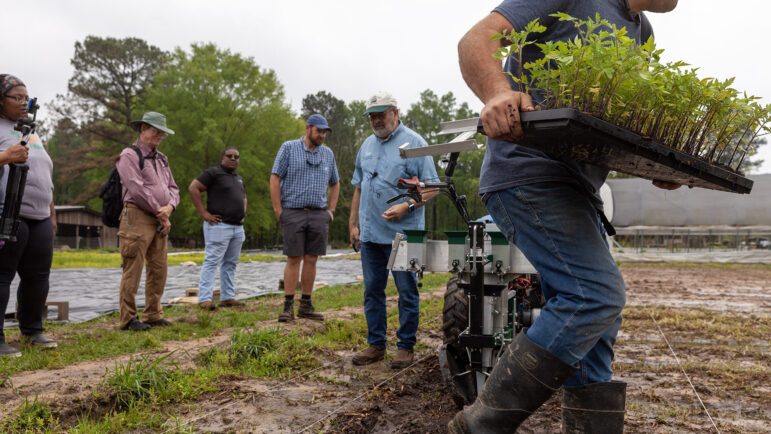
Campti Field of Dreams’ work and focus on climate-smart agriculture is happening at a critical time for the U.S. The approach is an increasing priority for the Biden-Harris Administration, underscored by an announcement in February that $19.5 billion from the Inflation Reduction Act would be provided over the next five years toward climate-smart agriculture through several of the conservation programs the U.S. Department of Agriculture’s Natural Resources Conservation Service (NRCS) offers.
The “once-in-a-generation” move will help the administration’s general efforts to improve the environment by reducing greenhouse gas emissions, storing carbon and more.
The funding will be available to farmers, producers and forest landowners using practices such as no-till farming, cover crops, tree planting and more to conserve their land.
In the Gulf South, Louisiana farmers are already experimenting with growing more naturally while causing the least amount of damage to the soil — making the education that Campti Field of Dreams provides all the more important.
Providing education for regenerative farming
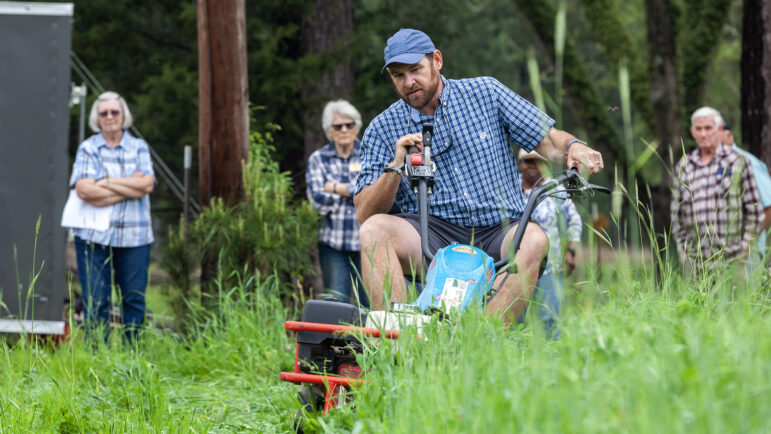
The NRCS in Louisiana already has a partnership with Campti Field of Dreams, and it’s seeing success in promoting these climate-smart agriculture practices to smaller producers with Isaacs through the series of workshops she holds.
The organization will lean on farmers and groups like Campti Field of Dreams to spread the word about climate-smart agriculture opportunities. It will be taking applications for climate-smart projects year-round thanks to the new funding.
“Those are good opportunities for producers to come and learn about climate-smart practices and how to farm the right way,” said Eugene Livingston, the state outreach coordinator for the agency. “Now, we’re trying to find different partners in local rural communities that can work within NRCS to help us set up local outreach meetings so we can get producers in the same room with us.”
Adjusting to climate change has become a large part of the work Campti Field of Dreams is doing, Isaacs said. Last year, Louisiana farms experienced extreme highs, droughts, unbelievable rainfall, cold earlier than expected and a deep freeze all in one year.
“This is going to continue to happen,” Isaacs said. “So we have to build our soil and build resiliency into our soil and into the way we grow food so that we can handle all of that.”
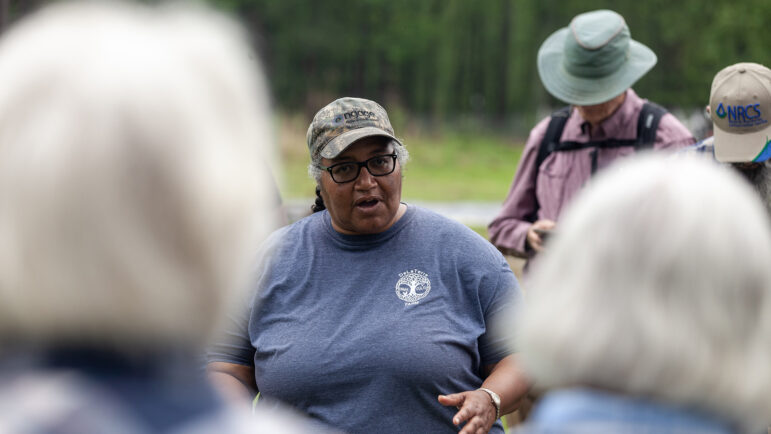
At the April workshop, people gathered at the DeLaTerre field to watch no-till farming techniques and innovative tools to save time, money and soil. Tilling disturbs the soil, which can harm its natural biology and cause erosion. Cover crops like clovers and oats are used to protect the soil and build up nutrients. Over time, that helps the soil retain more water and keep its biology healthy.
Regenerative agriculture is another tenet of Isaacs’ organization’s farming. It aims to reduce and avoid harming the soil with things like fertilizer, and it also works as a system — everything is connected. For example, the farm uses chickens to graze, and the bird’s waste is a natural fertilizer. Another principle is to incorporate livestock.
“In nature, you always have plants and animals,” Isaacs said. “The livestock provide the fertility, the plants provide the food. It’s a symbiotic relationship.”
Reaching rural farmers
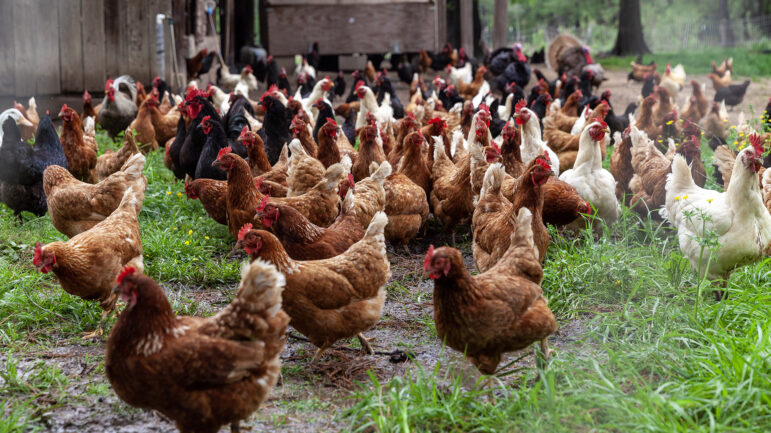
Johnny Horton, of Pumpkin Center, Louisiana, was one of the attendees at the April workshop. He showed up in hopes that these sustainable strategies can help him restore his family’s land.
Horton said decades of neglect ruined his soil quality, so he started coming to Campti Field of Dreams’ classes to learn how to improve it.
“I’m trying to get the organic matter up and the nutrient level up to where I can grow a lot more crops out there,” Horton said. “I’ve been trying to do all this ahead of time to get it ready for when I do retire.”
Horton currently works at the Jackson Parish Sheriff’s Office, has a body shop and also does electrical and air conditioning work to supplement his pay. But his retirement plan is growing unique crops — like yellow and purple tomatoes and jalapenos — for a niche business idea.
“Everything I grow, I look through seed catalogs, I find the odd stuff,” he said. “This year, I’m hoping to grow enough yellow and purple tomatoes, along with some yellow and purple jalapenos, to make some salsa. When I go down to the LSU football game for the tailgating, I’ll take some jars of purple and gold salsa.”
Funding underserved producers
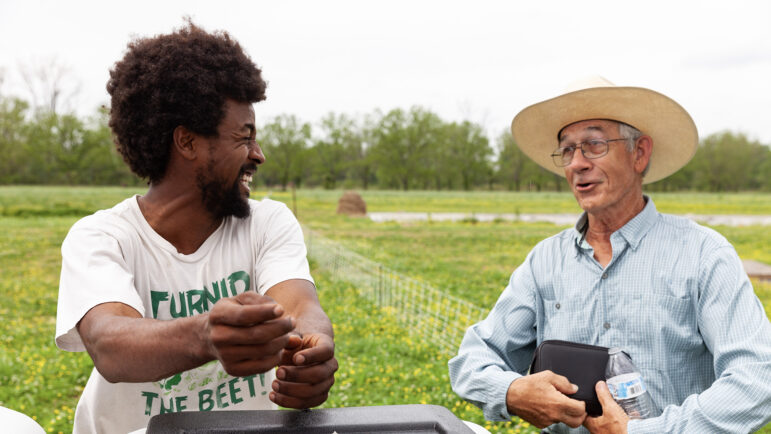
The new federal investment means that there are now billions of dollars that typically aren’t available for conservation projects — waiting to be used for everything from experimental equipment to irrigation and farmers trying out new growing techniques. This also includes finding ways to get federal money into the hands of underserved producers.
“We’re looking to get as many new customers in the door as possible because we’re going to have plenty of opportunities for them to receive funding,” Livingston said. “These funds were set aside to mitigate some of the additional costs that have occurred during the pandemic, with an emphasis on working with producers that historically haven’t worked with NRCS and implementing climate-smart practices.”
Jubilee Justice, in Alexandria, Louisiana, is already working to show how eco-friendly farming can create new opportunities for Black farmers through the Black Farmers’ Rice Project.
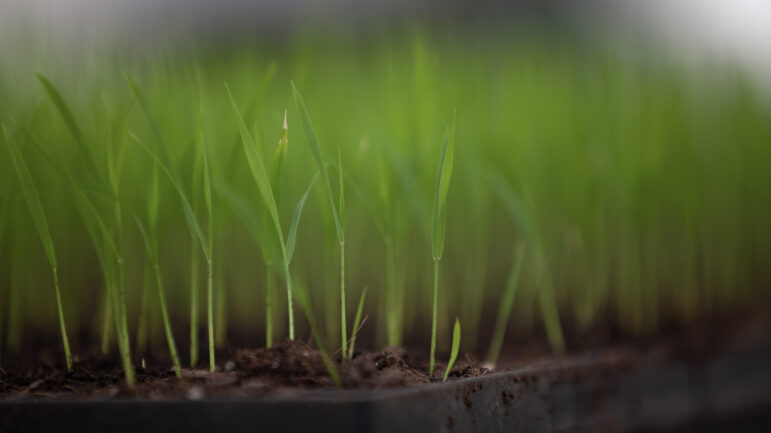
The rice project focuses on Black farmers because there are fewer of them and they have historically had less access to resources like loans from the USDA.
“That is why we started,” Konda Mason, the executive director and founder of Jubilee Justice, said. “It was. . . to impact climate in a positive way and to uplift farmers while doing it. It’s like that beautiful intersection of climate and justice.”
The program tests the System of Rice Intensification (SRI), which is a different rice cultivation approach. It uses less water while producing more rice and protecting the soil. The approach is important because agriculture is one of the primary sources of greenhouse gases in the U.S.
“Rice is one of the contributors to methane emissions, which is, you know, a driving force to climate change,” Erika Styger, director of the Climate-Resilient Farming Systems Program in the Department of Global Development at Cornell University and Jubilee Justice’s SRI and rice specialist and advisor, said. “So rice is a little bit globally a culprit of climate change, but also is suffering from climate change.”
The project teaches Black farmers how to use that system and farm in more environmentally friendly ways. Jubilee Justice works with several farmers across the South, which means they are learning what kind of rice will work in various soil types while using SRI.
Scaling up operations
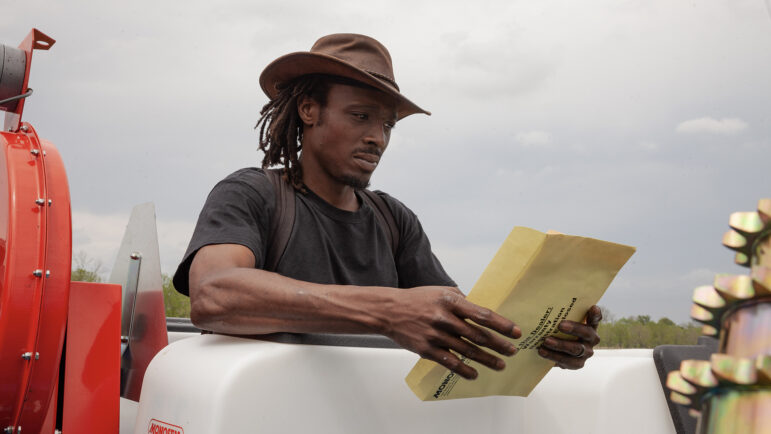
This year, Jubilee Justice is running a solar-powered rice mill, which is cooperatively owned by Black farmers and will give each of them a bigger share of the profits from rice production.
This new rice mill is a way for Jubilee Justice to scale up its operations and find more ways to benefit the partnering farmers. The goal is to take what’s learned trying to produce higher-quality, higher-yield crops while doing less damage to the environment, and bring it to more farmers throughout the Gulf South.
Bernard Winn, an operation specialist at Jubilee Justice, said he takes a lot of pride in the work that Jubilee Justice is doing. The work he’s done in his short time here is a lot different from his last job at a buffet restaurant.
Less than a year ago, Winn was working both jobs simultaneously — helping with the rice mill during the day, then working his buffet job at night. He remembers feeling conflicted about the two gigs when his bosses at the buffet would tell him to throw away leftover food at night, even when he asked to take some with him to give away.
Eventually, the contradiction between the two roles was too much.
“It got to the point where… how am I trying to save the planet on the one hand during the day, and then at night I’m throwing away pounds of food?” Winn said. “That was my shift.”
The constant push to come up with better, greener farming techniques has been eye-opening for Winn.
“It was completely new to me and to see what’s happening in the way that we can farm regeneratively, without harming the community or the soil or the earth, it’s been a sight to see,” Winn said.
This story was produced by the Gulf States Newsroom, a collaboration between Mississippi Public Broadcasting, WBHM in Alabama, WWNO and WRKF in Louisiana and NPR.
40 years after ‘Purple Rain,’ Prince’s band remembers how the movie came together
Before social media, the film Purple Rain gave audiences a peak into Prince’s musical life. Band members say the true genesis of the title song was much less combative than the version presented in the film.
Park Fire in California could continue growing exponentially, Cal Fire officer says
Cal Fire has confirmed that over a hundred structures have been damaged in the Park Fire, which grew overnight near Chico, Calif. Difficult firefighting conditions are forecast through Friday night.
Checking in with Black voters in Georgia about the election, now that Biden is out
Some voters who could be key to deciding who wins Georgia. What do they think about Vice President Harris becoming the frontrunner in the race to be the Democratic nominee?
Tahiti’s waves are a matter of ‘life and death’ for surfing Olympics
Tahiti's Teahupo'o wave has a slew of riders for the Paris 2024 Olympics. NPR finds out why it's called one of the most dangerous waves.
Researchers are revising botanical names to address troubling connotations
Since the mid-1700s, researchers have classified life with scientific names. But some of them have problematic histories and connotations. The botanical community is trying to tackle this issue.
A spectacular opening ceremony wowed a global audience despite Paris’ on-and-off rain
The Paris Olympics opening ceremony wowed Parisians, fans and most everyone who was able to catch a glimpse of thousands of athletes floating down the Seine to officially begin the Games.



